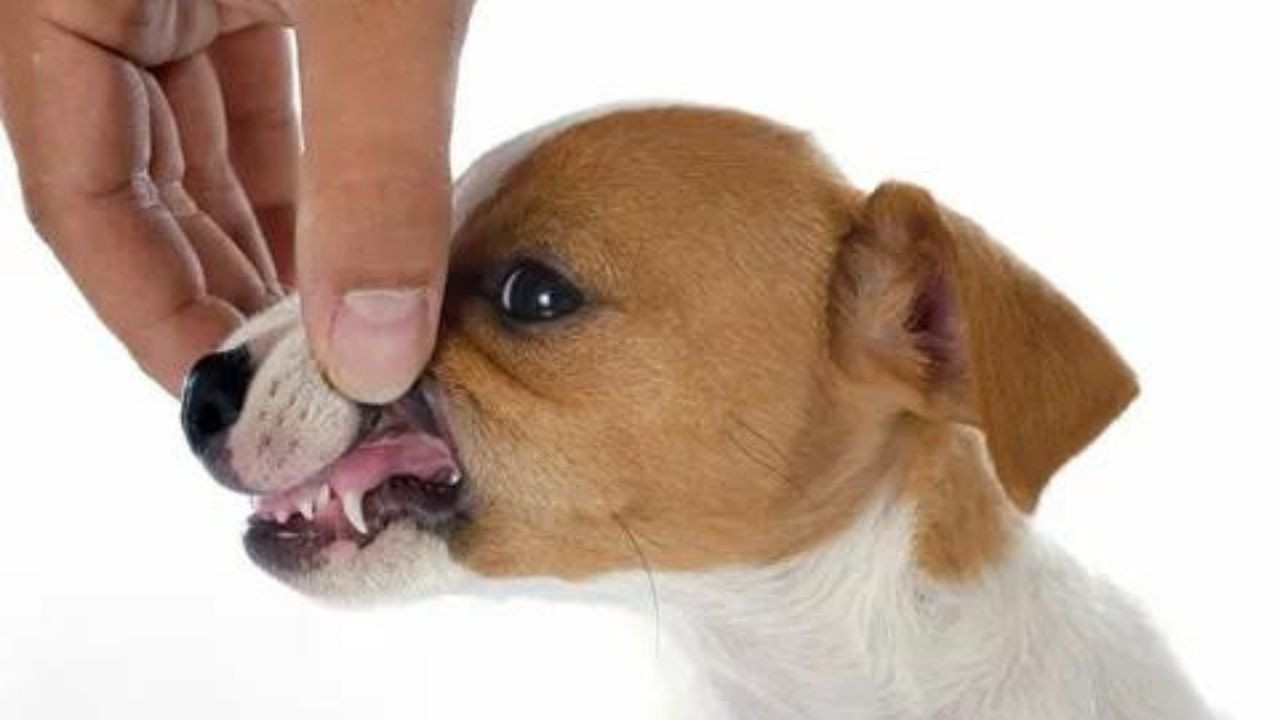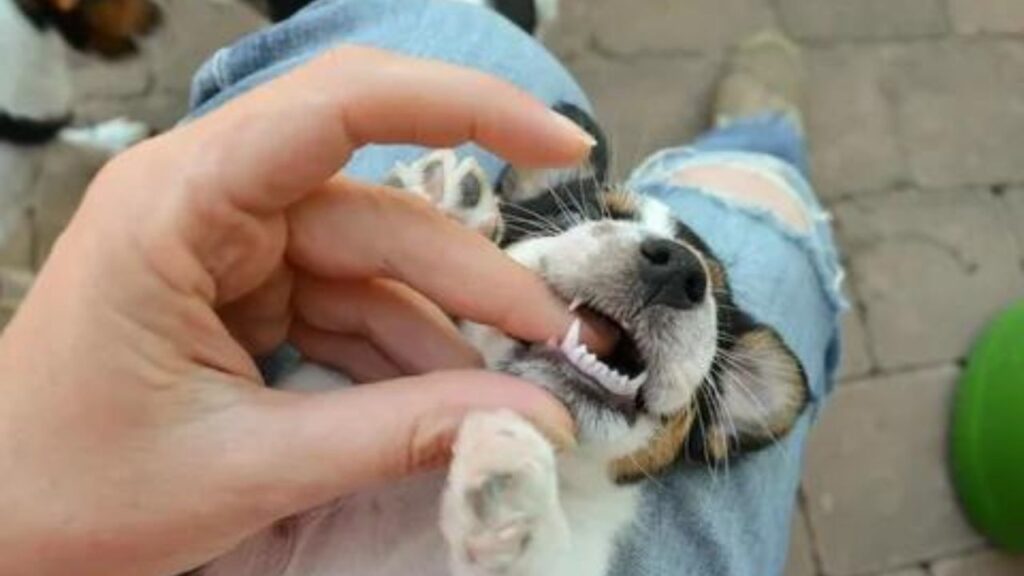
It’s critical to comprehend the many facets of puppy growth, particularly the developmental stages related to their teeth. Similar to human newborns, puppies experience teething, which has a big influence on their general health. In this extensive guide, we’ll go over the phases of puppy teething, what to anticipate at each step, and how to make sure your pet has a smooth and safe transition to maturity.
What is Teething
The emergence of new teeth through the gums during teething is uncomfortable and sensitive. Puppies may show signs of discomfort from sore gums at this time, such as increased chewing, drooling, and irritability. Deciduous teeth usually erupt initially, and then they shed to create room for permanent dentition. This is how the process usually proceeds in phases.
The Teething Process in Puppies

Puppies go through a critical developmental stage called teething, during which time their teeth erupt and replace one another. Puppies may explore their surroundings and develop eating habits by cutting their deciduous teeth, commonly referred to as baby teeth, starting at three weeks of age. Their socialization and transition to solid meals depend heavily on this stage.
Around three or four months, when the pups begin to shed their baby teeth to make room for the adult dentition, the teething process becomes more intense as the deciduous teeth complete their function.
There may be soreness during this shift, which might result in increased chewing habits, drooling, and sporadic anger. During this time, responsible pet owners are crucial because they provide appropriate chew toys, practice oral hygiene, and keep an eye out for any indications of suffering.
Signs of Teething in Puppies

Pet owners must recognize the teething indications in their puppies to offer the right comfort and care during this normal growing stage. An obvious sign is increased chewing activity, as puppies naturally try to soothe the pain of their teeth coming in. They could have a predilection for chewing on toys or other things, which would increase their demand for oral stimulation.
Drooling excessively is another obvious symptom of teething. Puppies may drool more as their new teeth erupt because they are secreting more saliva. This is a typical reaction to the modifications taking place in their mouths.
Behavior changes and irritability are further indicators of teething pain. When their lips are stroked, puppies may become more fidgety, have moments of heightened sensitivity, or even display indications of pain. It’s crucial to have empathy and patience during these moments.
When Do Puppies Start to Get Teeth
Between two and three weeks of age is when puppies usually start to erupt their first set of teeth, sometimes referred to as deciduous or baby teeth. This is the first stage of their dental growth. In the process, incisors emerge first, and by the end of the fourth week, all 28 deciduous teeth—incisors, canines, and premolars—should be fully developed.
The deciduous teeth of pups continue to grow until they begin to lose these temporary teeth, which happens between 12 and 16 weeks of age. Their permanent dentition emerges as a result of this shedding process.
Best Way to Monitor Teething
Keeping a close eye on teething pups while also taking preventative measures is the best approach. Initially, keep an eye out for any behavioral changes, including increased biting or nibbling on objects, as well as any possible pain indicators like excessive drooling or impatience. Examine your puppy’s mouth frequently, noting any anomalies or newly erupting teeth.
To relieve sore gums and promote good chewing habits, provide appropriate chew toys with a variety of textures. Keep an eye on these toys’ wear and tear to make sure they continue to be reliable and safe. Have a good connection with your veterinarian and schedule routine check-ups so that you can talk about your puppy’s dental growth and take care of any issues right away.
Eating a balanced diet promotes oral health as well as general wellness. Opt for age-appropriate and nutritious foods, and consider offering frozen items like washcloths or specially designed teething toys to alleviate discomfort.
Potential Challenges During Puppies Teething
Although it’s a normal stage of growth, puppies’ teething can provide significant difficulties for both their owners and their furry friends. Puppy pain with the eruption of their permanent teeth, which replaces their deciduous teeth, is a frequent problem. Increased chewing habits, excessive drooling, and sporadic irritation might be signs of this pain.
Puppies may chew on inappropriate objects to ease their gum pain, which presents another problem. This may result in harm to shoes, furniture, or other home items. Pet owners must provide their animals with appropriate chew toys to stop this habit and safeguard their possessions.
It might also be difficult to maintain a puppy’s dental hygiene while it is teething. New teeth may encourage the formation of plaque and tartar in an environment where saliva production is elevated. To avoid oral health problems, it becomes imperative to exercise regular dental hygiene, such as brushing and giving dental chews.
When Do Puppies Stop Teething
Puppies usually finish their teething adventure by the time they are six or seven months old. The shift from baby (deciduous) teeth to a complete set of 42 permanent teeth ends at this time. Although each puppy’s timetable may differ, most puppies finish their teething process during this period.
When Do Puppies Lose Their Baby Teeth
Around 12 to 16 weeks of age, puppies start to lose their baby teeth, commonly referred to as deciduous teeth. The progressive replacement of the temporary set of teeth by the permanent adult teeth signals the beginning of the transition from puppyhood to adolescence. A puppy’s natural tooth-shedding process is essential to the growth of its teeth.
The baby teeth get looser and finally fall out as a result of the permanent teeth pressing against their roots when they erupt. During this time, pet owners could detect little teeth in their puppy’s chew toys or around the house. In most cases, the shedding happens in a particular order: the incisors fall out first, then the canines and premolars.
How should I care for my dog’s adult teeth
The maintenance of your dog’s mature teeth is essential to their general health and welfare. Developing a regular dental care schedule can help your dog live a happy, healthy life by preventing tooth problems.
The following are essential procedures for caring for your dog’s mature teeth:
Regular Brushing
Use toothpaste and a canine toothbrush to give your dog’s teeth a cleaning. Start slowly and make it enjoyable by giving out rewards and compliments. Try to brush many times a week to get rid of plaque and avoid tartar accumulation.
Dental Chews and Toys
Offer toys or dental chews that are intended to improve oral health. These products provide your dog with a fulfilling chewing outlet while also assisting in the reduction of plaque and tartar.
Balanced Diet
Give your dog a wholesome, well-balanced meal to help with tooth health. There are commercial dog feeds with reduced levels of plaque and tartar, as well as diets tailored specifically for oral health.
Regular Vet Check-ups
Make time for regular veterinarian exams, such as dental ones. Your veterinarian may offer advice on at-home dental care, suggest professional cleanings, and spot possible problems early.
Professional Dental Cleanings
Consider professional dental cleanings as advised by your veterinarian. These cleanings involve scaling, polishing, and, if necessary, addressing dental issues under anesthesia.
Monitor Oral Health
Keep an eye on your dog’s oral health, watching for signs of gum disease, bad breath, or changes in eating habits. Any abnormalities should prompt a visit to the veterinarian.
Conclusion
One of the most important aspects of effective puppy care is knowing when puppies develop teeth. A puppy’s teething process is a normal and essential stage of growth, and you can ease your pet through this phase with the right care and attention. As you watch your puppy’s behavior, provide appropriate chew toys, and take excellent care of their teeth, you’re contributing to their general health and laying the groundwork for lifelong good oral hygiene.
FAQ
When do puppies start losing their baby teeth?
Puppies begin losing their baby teeth and getting their adult teeth at around 4 to 6 months of age. This process continues until they are about 6 months old.
Is it normal for puppies to experience discomfort during teething?
Yes, teething can be uncomfortable for puppies. You may notice them chewing on objects more frequently or exhibiting mild signs of discomfort. Providing appropriate chew toys can help alleviate this.
When should I start brushing my puppy’s teeth?
You can start introducing tooth brushing as early as possible to establish a positive routine. However, wait until the adult teeth are fully in before using a dog toothbrush and toothpaste.
Can I give my puppy treats during the toothing process?
Yes, but choose treats designed to promote dental health. There are dental treats specifically formulated to help clean your puppy’s teeth as they chew.
When should I schedule my puppy’s first dental checkup?
Consult with your veterinarian to determine the best time for your puppy’s first dental checkup. They can guide on maintaining good oral health from an early age.






